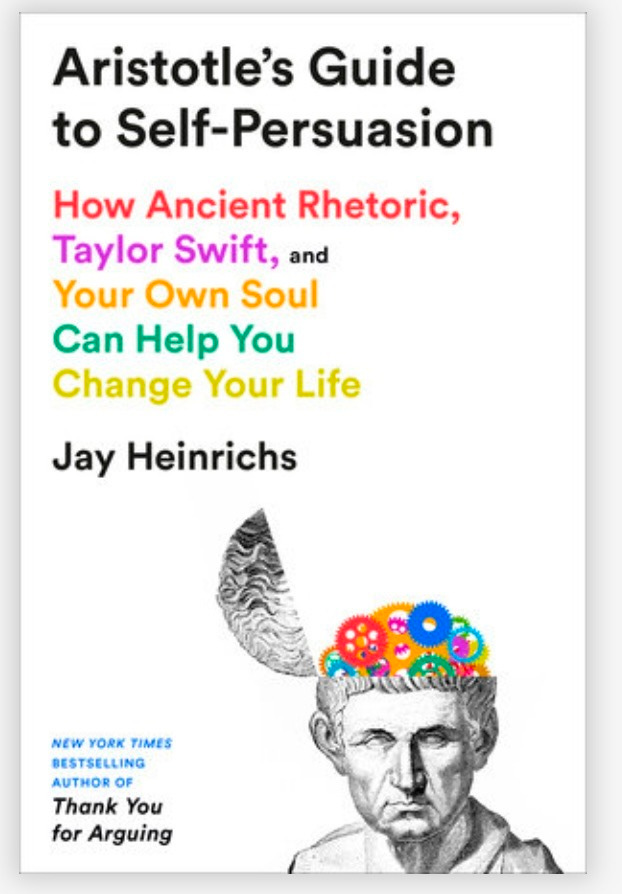News getting you down? Take some Aristotle.
A dose of inductive logic will make you feel like a new citizen!
If our news consisted solely of fact-checked, peer-reviewed data, the world would look very different. Imagine that a Reality app on our smartphone consisted of just three buttons labeled D,T, and U.

D is for DATA: Just the bare and numerical facts, Ma’am.
T is for TRAVEL: Instant access to one’s airline of choice and the Going app, our portal to the undigitized, IRL world.
U is for URGENT: Local weather plus the Instagram feed of grown children who fail to reply promptly to our emails.
Would a DTU Info app make us more ignorant? Less? Let me know what you think.
One thing would be certain: we’d be a lot calmer. (Unless that Instagram feed shows alarming photos of a daughter in a string bikini hanging with some seedy influencer in…Baghdad?)
Meanwhile, to keep our heads during these ghastly times, it’s helpful to favor logos over pathos. When some singular event occurs, try some inductive logic. In a previous post, I covered this rational theory using Taylor Swift and Area 51 as examples. Today, let’s do something about the news.
Take a recent event, the Air India crash. Horrible. Using Aristotelian logic, we make the story pass a series of qualifying steps. Aristotle called them “causes,” as in material, efficient, formal, and final.
1. Is it real?
Or is it fake? Technically, Aristotle would say we’re exploring the material cause—what this news is made of. Real facts? A Russian bot’s hallucination? A president’s bloviation? Obviously, you need to decide whether to trust where you got the report. So we default to…
2. What’s its origin?
This is Aristotle’s efficient cause, which has to do with the producer of a thing. Personally, I tend to favor the news I pay for. Free information is rarely truly free. (Except for this newsletter, of course, whose generous purpose is to spread the gospel of rhetoric while hawking my new book.)

In this case it does appear that a Boeing 787 Dreamliner (the name is starting to sound a bit creepy) crashed soon after takeoff.
3. Why?
Here I only seem to stray from Aristotle. He labels this third test the formal cause, meaning the form something takes. When it comes to news, the why constitutes the shape and “isness” of a story. The what is just…some words or video. The why makes it relevant.
Why did the plane go down? Poor maintenance? Pilot error? Errant pigeons? “It could take months or years to determine the cause of the crash,” notes the New York Times. Still, some instant experts are already claiming terrorism. Our natural tendency to fill in our ignorance with speculation causes all kinds of trouble. Innocent people get harmed when illogic leads to blame.
4. Is it a trend?
This is the final cause—what a thing leads to. A plane crashes. A politician gets murdered. A kid gets napped. A self-driving car stops on top of a pedestrian. What do these terrible stories lead to? And what are the odds that the same thing might happen to you and yours?
In the case of that Air India flight, the plane had successfully taken off and landed almost 8,000 times before it crashed. True, the Boeing brand has lost some of its trustworthiness in recent years, with two crashes of the troubled 737 Max in 2018 and 2019. Last year another Dreamliner blew a hole, letting in an alarming blast of thin air.
Yet do these several incidents—in an industry that launches almost 102,000 flights every day—count as a trend? A statistician would say we don’t have enough data. Yet judging by the news, we’re headed for an airplane Apocalypse. “Stick to driving,” advises the invevitable doomscrolling relative whose iPhone fails to remind her that our highways kill some 40,000 people a year.
You and I, on the other hand, have logical Aristotelian souls. We keep calm, carry on, and only occasionally find ourselves trapped in a spiral of talk show hosts running the Pentagon or science or whatever and holy shit have we all gone completely insane?????
Hey, neither of us is an Aristotle. Besides, logic alone won’t get us out of the chaos we find ourselves in today. Induction won’t rid the world of cruelty or get rid of despots. But Aristotle, along my beloved Epicureans, can help us control ourselves.
In a previous post, I talked about chaos theory, and the ancients taught us to rise above the confusion. Besides learning proper logos, we can engage with our ethos. That starts with knowledge of your own soul and the ways your soul gets you to act.
That wisdom aligns with a sermon the Reverend Dr. Guy J. D. Collins gave last Sunday.
Today I ask you not to focus on the abyss of lies that swirls all around us. Focus instead on the gap in your own heart between what you profess to believe and what you do because of that belief.




DTUM. Because without Memes, Americans would be unable to communicate.